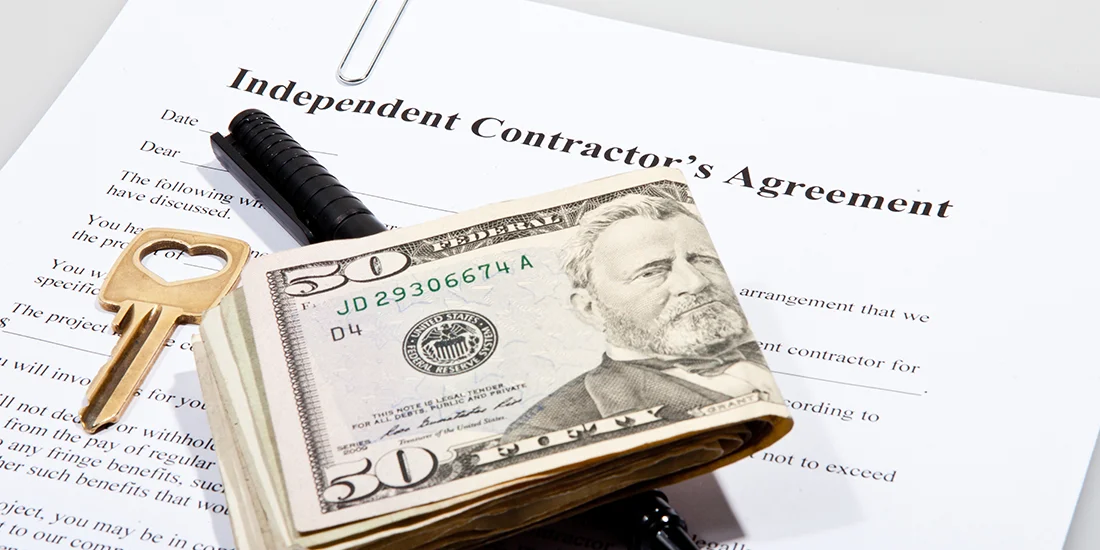
Loans for Independent Contractors with Bad Credit: Explore Your Options
10 Min Read
Despite all the flexibility, people working under a 1099 contract can face difficulties securing new loans. This happens due to their unpredictable incomes, which may lead to late or missed payments. And if a self-employed individual has bad credit, the risk of loan denial rises even more.
Luckily, there are some options available for those in this situation, including specialized loan programs designed to accommodate the unique financial circumstances of freelancers and independent contractors. These programs often take into account alternative income verification methods and provide more lenient credit requirements, making it possible for self-employed individuals to secure the financing they need.
Self-Employed vs. Independent Contractors
Self-employed people run their businesses, from sole proprietorships to LLCs, handling everything from budgeting to business planning. Independent contractors work under specific contracts for multiple clients. Both must meet regulatory requirements, like licensing, and pay self-employment taxes. They face the risk of inconsistent income and lack of employer benefits, which can make getting a loan challenging.
Here are some examples of professions and scenarios that typically fall under the categories of self-employed individuals and independent contractors:
Self-Employed Individuals
- Someone who owns a small store.
- Someone who owns a restaurant, cafe, or small food truck and is responsible for all processes, from menu development to money management.
- An independent real estate broker who has exclusive properties and a client base.
- A personal trainer who is self-employed and conducts classes in a public garden or personal studio.
Independent Contractors
- Freelance writer producing content for books, periodicals, and companies on a project-by-project basis.
- A contract IT consultant who helps a company with system deployment or troubleshooting.
- A graphic designer who creates logos, marketing materials, and digital content for different clients.
- A construction worker, who is a specialty, works for a separate construction company or customer.
What Criteria Must Be Met to Secure Loans for Independent and 1099 Workers?
While each lender may have different criteria for loan documentation, the borrower’s income and credit history are often the main points of interest for most traditional lenders. However, banks often reject independent contractors, so these workers frequently turn to private lenders. The following list of paperwork is typically needed to apply for a loan through an alternative loan provider:
- Documentation proving identity, like an ID or driver’s license.
- Evidence of residency, such as a rent agreement or power bill.
- Bank account statement.
- The basic tax return, IRS Form 1040, and Form 1099 for the previous year, is required to confirm your income and ability to repay the loans.
- If you’re also officially employed, you can provide a W-2 form to improve your approval chances.
Lenders use these documents to determine loan amounts and interest rates and evaluate your creditworthiness. They may also request income statements, operating permits, and proof of business ownership. Since terms might vary depending on the lender and type of loan, check with the necessary documentation in advance.
Types of Available Loans for Self-Employed and Independent Contractors
Self-employed workers and independent contractors have many lending options, including loans from traditional and online direct lenders and Small Business Administration (SBA) loan programs. Here’s a closer look at them.
SBA Microloans
The SBA loans program offers up to $50,000 in small business loans for self-employed with bad credit. These monies can be utilized as working capital or to buy supplies and equipment. Providers of such loans are typically non-profit organizations. The requirements to qualify for these micro-loans are simple: the business idea must be viable, and the borrower must demonstrate stable income. In this case, credit history is not a fundamental factor in loan approval.
SBA 7(a) Loans
This program is the main avenue for assistance for small firms and individuals with lower credit ratings who have difficulties obtaining traditional loans. Borrowers may utilize this loan for any purpose, and they can get up to $5 million, which is perfect for some major expenses. While there isn’t a specific minimum credit score requirement for this loan type, lenders generally prefer applicants with a score of at least 640.
However, there are options available for those with lower scores as well.
SBA CDC/504 Loans
With the assistance of private lenders and SBA-partnered certified development corporations (CDCs), this program enables you to buy large equipment or real estate. It offers fixed-rate, long-term loans, making it easier to manage corporate finances. The program is appropriate for 1099 employees who are going to invest in significant assets. However, you may be asked to have at least a fair credit score and demonstrate your ability to repay the loan.
SBA CAPLines Program
Credit lines are available through the CAPLines program for various transient needs. This program is appropriate for independent contractors with erratic income flow, such as those who get paid late. It simplifies handling continuing expenses for 1099 workers by allowing them to borrow against their future profits. CAPLines give your loan repayment capacity more weight than your credit history.
Personal Loans for Poor Credit
Personal loans for independent contractors are available in both secured and unsecured forms. They are paid back in equal monthly installments within up to 60 months and can be used for both corporate and personal purposes. These loans have maximum loan amounts of $50,000 with interest rates of up to 35.99%. Some lenders specialize in these loans, but the terms are often not ideal. The interest rates might be significantly higher compared to traditional loans, further increasing the financial burden on the borrower. For those with no credit, the challenges are even greater, but there are still personal loans available.
Lines of Credit
A line of credit offers flexible access to funds up to a specified limit. Borrowers can draw from the line as needed and pay interest only on the amount used within a draw period. In addition, after this period, you will have to pay both interest and the loan principal. This is ideal for managing cash flow and unexpected expenses.
Payday Loans
A payday loan is a short-term loan typically for 14 days or until your next paycheck. The maximum loan amount is normally $1,000. However, each state may have different requirements and interest rates.
Interest rates on payday loans exceed 400%, and late payments incur additional penalties, making the loan even more expensive and potentially leading to severe financial strain for borrowers. A payday loan may seem appealing if you are self-employed and need money immediately, but if you’re not sure you can repay it on time or need to cover a longer-term need, you might want to look into other options.
Credit Cards
A credit card can keep your business up if used wisely. You can spend money without paying interest during the trial 0% interest period provided by some credit card issuers. Before this period expires, it is crucial to pay off the entire loan. Otherwise, interest can increase to 29.99%. You must also have a solid credit history to obtain a credit card. Careless credit use can severely impact your credit score and financial stability. Comparing personal loans versus credit cards might help you decide which option is best for you.
Peer-to-Peer Lending
If you’re a contract worker needing financing, peer-to-peer lending services can be an option. Bypassing banks, this approach enables you to borrow money from individual investors via internet platforms. Peer-to-peer financing is usually quicker and easier to get than traditional loans, and it can offer more flexible terms. If your credit history is strong, interest rates may be quite appealing.
Strategic Use of No Credit Check Loans for Independent Contractors
Here are some common ways self-employed individuals can use debt:
Enhance Business Operations
Loans are provided to independent contractors to expand their businesses and improve the quality of their work. Your company can operate faster and more efficiently if you invest in new technologies and tools. Thanks to this, you can improve customer satisfaction and increase your income.
Finance Marketing and Advertising Strategies
You need to invest money in marketing to make your company recognizable and attract new clients. These are huge costs that are not always freely available. A loan can help you update your website, make it more aesthetically pleasing and user-friendly, launch online advertising campaigns, or improve your SEO. You can also use this money to attend conferences and exhibitions to expand your network of clients and improve your brand’s presence.
Invest in Employees’ Education
Independent contractors should invest resources in self-development. And this requires colossal investments. In this case, you can take out a loan and pay for advanced training courses, which will only benefit the business. All these can significantly boost your expertise, productivity, and income.
Buy Inventory
You can use a loan to restock supplies when they run low and even get a volume discount by purchasing in bulk. A current inventory draws in more clients and opens up new markets for your company.
Create Additional Working Capital
Loan proceeds can cover rent, utilities, and salary without impacting personal savings. This helps the business run smoothly, especially during the off-season or unforeseen downturns.
Refinance Another Loan
Refinancing current debts with loan funds can reduce an interest rate and increase payback times. This approach lessens monthly payment obligations, improves cash flow, and directs resources toward other important aspects.
Expand Your Products and Services
Increasing the selection of goods and services can lead to additional revenue streams. Loan cash might be utilized to develop new offerings that clients want, do market research, and launch new items. Maintaining happy and involved consumers may also entail expanding into new markets or enhancing existing services.
Bottom Line
The financial needs of self-employed individuals may vary. Therefore, before choosing a loan, you should ask yourself a few questions:
- How much cash do I require? After you know how much you need to expand your company or pay for urgent needs, you can choose the best finance. At the same time, it is worth assessing how much you can return.
- Why am I borrowing money? Credit usage guidelines vary among providers. Different types of financing are designed for working capital, equipment, or commercial property purchases.
- What conditions can I get? To understand what you can count on, you need to evaluate your credit rating, income stability, and years of work in business. For example, many SBA lenders require a credit score of 620 or higher, a high income, and a long business history. Loans or business credit cards offered by online lenders may be better if you don’t meet these requirements.
1F Cash Advance is a connecting service that can help you find the right type of loan. Fill out the application to easily receive offers from direct lenders.
FAQs
Is It Hard to Get Loans for the Self-Employed with Bad Credit?
Although getting a loan as an independent contractor can be harder, it is nevertheless doable. You need to find the right lender and submit comprehensive income verification, usually 1099 forms, bank statements, and tax returns.
Can I Use My 1099 to Get a Loan?
Yes, 1099 forms can prove income when applying for a loan.
What Loan Amount Could I Qualify for as a Self-Employed Individual?
Depending on the loan type, the maximum amount can range from $100 to $50,000, with some options as high as $5 million. Your income, credit history, stability, and loan type determine the maximum amount.
Is It Possible for Self-Employed Individuals to Secure Car Financing?
Yes, self-employed people can get a car loan. To do this, you need to provide proof of income (tax returns, bank statements), have a good credit rating, and have low debt. A large down payment helps, too. It is worth considering different banks and credit organizations, and you can also attract a guarantor. Your income must be stable for several years.
Is There a Way to Obtain a Loan without Providing Proof of Income?
While some lenders provide loans without proof of income, the conditions and interest rates are usually more stringent. This can be risky, as such lenders may not adhere to the responsible lending principles , which can often be a sign of predatory lending practices. These lenders might take advantage of borrowers’ financial situations, leading to even more severe financial difficulties in the future.
Get Approved for a Loan with Any CreditApply




